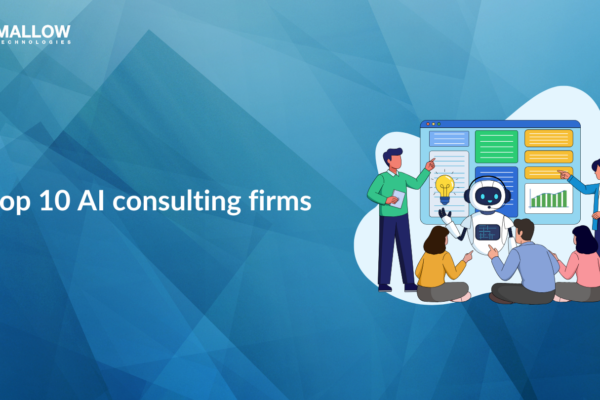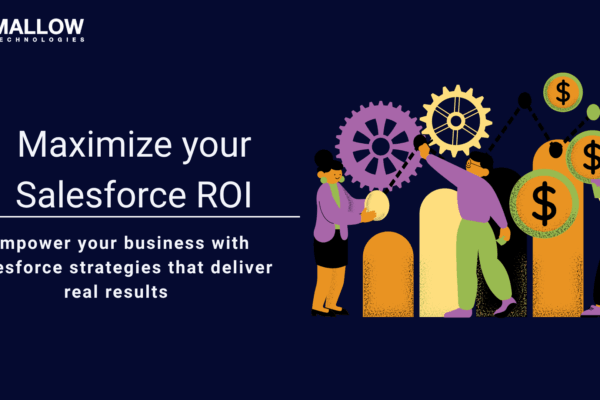In today’s fast-paced digital world, adopting DevOps practices is essential for improving efficiency, saving time, and delivering high-quality results. If you are unsure where to begin or how to prioritize your DevOps efforts, this guide will help you understand the key steps and make confident decisions.
At Mallow, we have years of hands-on DevOps experience and a strong record as an outsourcing partner. Our team has worked with many industries and technologies, consistently delivering projects that create meaningful transformation for our clients. This experience helps us guide you through the most important factors to consider when outsourcing DevOps consulting services.
By the end of this article, you will have a clear understanding of the critical elements involved in outsourcing DevOps consulting. This knowledge will help you make informed decisions that lead to better results for your organization and a stronger return on investment.
What is DevOps outsourcing and why you should consider it?
DevOps outsourcing involves partnering with external experts to manage and optimize your DevOps processes, combining development and operations to enhance efficiency and delivery speed.
Here’s why you should consider it:
- Access to expertise: Gain specialized skills and experience without building an in-house team.
- Cost efficiency: Cost efficiency is one of the most compelling reasons companies turn to DevOps outsourcing. By eliminating the need to maintain a large in-house team, organizations can reduce overhead costs associated with full-time employees. According to Instatus, outsourced teams allow businesses to access top-tier talent on demand while optimizing operational spending.
- Focus on core activities: Allow your internal teams to concentrate on strategic business goals.
- Scalability: Adjust resources based on project needs and business demands.
- Enhanced security: Benefit from advanced security measures and compliance with regulations.
- Faster time-to-market: Accelerate development and deployment with automation and continuous delivery.
- Continuous improvement: Leverage the latest tools and practices for ongoing innovation.
Outsourcing DevOps services offers numerous advantages, including cost savings, increased efficiency, and the ability to stay ahead in a competitive market. Explore here to enhance your understanding of how DevOps companies contribute to the value of your application development, and uncover how an outsourced DevOps team operates along with the benefits it can bring to your projects.
What are the benefits of outsourcing DevOps services?
Outsourcing DevOps provides benefits beyond cost savings. It helps businesses adopt automation, improve scalability, and build more reliable systems. It also reduces the operational burden on internal teams.
With access to global DevOps expertise, organizations can respond quickly to changing demands. They can maintain better system uptime and achieve more consistent deployments and monitoring.
Experienced DevOps partners use proven frameworks and ready to use tools. These tools streamline delivery pipelines, support compliance, and improve system performance. As a result, businesses experience faster release cycles and fewer disruptions.
Stronger collaboration between development and operations teams also improves outcomes. This leads to better customer experiences and stronger returns on investment.
How DevOps outsourcing supports digital transformation
DevOps outsourcing supports digital transformation. It helps align technology, processes, and team collaboration. External experts bring strong technical skills and broad industry experience. This allows organizations to modernize faster and more effectively.
For businesses moving to the cloud or adopting microservices, outsourced DevOps teams provide valuable support. They help with integration, automation, and environment management. These specialists can build CI CD pipelines, implement monitoring practices, and deploy scalable infrastructure.
This approach makes transformation efforts more efficient and sustainable. It also helps organizations become more agile and better prepared for continuous innovation.
What is DevOps outsourcing and why you should consider it?
What are the benefits of outsourcing DevOps services?

Before exploring outsourcing options, clearly define your organization’s goals and challenges. This step helps you choose a consulting partner that fits your needs and ensures your investment delivers real value.
Follow these steps:
1. First, identify your goals and pain points. Do you want to speed up software delivery, improve collaboration between development and operations, or strengthen automation? Clear goals will guide your partner selection.
2. Next, convert these insights into specific and actionable objectives. These objectives should shape your DevOps strategy.
3. Finally, remember that this assessment is ongoing. As your business grows, your DevOps needs will change. Regular review and alignment are essential for long term success.
Take time to research and select the right DevOps service provider
Choosing the right service provider is an important decision. It requires careful research and clear evaluation. With many companies claiming expertise, it is important to look beyond marketing claims.
Focus on finding a true partner, not just a vendor. The right partner understands your vision and shares your goals. They also have the skills and experience needed to deliver successful DevOps outcomes.
To get started, take a structured approach by defining your main needs, budget, and what you expect from a partner. Here’s how:
1. When assessing potential DevOps service providers, start by examining their track records and expertise.
2. Review their history of similar projects to gauge their capability and adaptability to your project’s scale and complexity. According to the Harvard Business Review, evaluating DevOps vendors should include assessing their technical expertise, adaptability, and cultural fit to ensure a successful partnership.
3. Pay close attention to their technological expertise and how they’ve addressed past challenges.
4. Seek client testimonials and case studies to understand their performance and client satisfaction.
5. Request detailed case studies and reach out to past or current clients for honest feedback on their services, focusing on their working style, communication effectiveness, and the value they’ve delivered to other businesses.
6. Finally, ensure the provider demonstrates flexibility in their approach, willing to adapt their methods to align with your needs and requirements.
Make sure you have uninterrupted access to the DevOps experts you need
DevOps consulting gives you access to experienced professionals with fresh perspectives. These experts stay updated on current tools and industry trends. They also anticipate changes and adjust strategies to match evolving needs.
Their insights are valuable in today’s fast moving software environment. To gain the most benefit, structure your partnership to ensure ongoing access to their expertise. Continuous collaboration helps your organization stay aligned with best practices and long term goals.
Here’s how:
1.
Seek service providers interested in long-term partnerships rather than short-term projects. This fosters deep familiarity with your infrastructure, culture, and goals, enabling consistent and tailored advice over time.
2.
Ensure the consulting service assigns a stable, skilled team to your project to minimize turnovers and maintain project momentum.
3.
Establish a system for regular updates and check-ins with your DevOps consulting team to tap into their expertise and align contributions with evolving project needs.
Consider how you can manage costs and your budget effectively
Effectively managing costs and budget when outsourcing is crucial to ensuring you get the best value for your investment. Proper planning and understanding of financial commitments can prevent unexpected expenses and align expectations with the services being offered. According to 1840 & Company, early discussions about cost structures and transparent negotiations are essential to prevent surprises and maintain financial alignment throughout the partnership.
Here are key considerations to help you make informed decisions:
1.
Early discussions with potential service providers about cost structures can prevent surprises later on. Understanding what is included in the quoted price and what might incur additional charges helps maintain transparency and avoids hidden costs.
2.
While outsourcing can be cost-effective, it requires careful planning and negotiation. Comparing offerings from multiple providers based on their overall value proposition, including expertise, range of services, and scalability, ensures you choose a partner that offers the best fit for your organization.
3.
Establishing a budget upfront serves as a financial roadmap to guide decision-making and ensure alignment with your company’s financial capabilities and strategic goals. A clear budget helps prioritize spending and avoid overspending.
Ensure efficiency and productivity throughout collaboration
When you outsource DevOps consulting, you are not just hiring a team. You are building a partnership. A strong partnership can improve efficiency and productivity. Poor collaboration can lead to delays and missed opportunities.
To succeed, your internal team and outsourced experts must work as one unit. Clear communication and shared goals create an agile and informed team. This helps address challenges with a wider range of skills and perspectives.
Here are practical ways to improve collaboration:
1. Establish clear communication channels – Use tools such as Slack, Microsoft Teams, or regular video calls. These channels support quick problem solving and keep everyone aligned.
2. Schedule regular check-ins – Hold daily or weekly meetings to review progress and identify roadblocks early. This ensures priorities remain clear and teams stay on track.
3. Use shared project tools – Adopt common tools for project management and documentation, such as Jira, Confluence, or GitHub. Shared systems improve transparency and task tracking.
4. Encourage knowledge sharing – Promote open exchange of ideas between internal teams and DevOps consultants. Respect different working styles and cultures. This builds trust and strengthens teamwork.
Address technology risks and challenges

Organizations encounter a multitude of risks and challenges that can significantly impact their operational efficiency, security, and competitive edge. Addressing these challenges requires a strategic approach to leverage expertise and insights effectively. According to a report by the National Institute of Standards and Technology (NIST), integrating cybersecurity throughout the DevOps pipeline is critical for mitigating operational and compliance risks, particularly as threat vectors grow more sophisticated.
When considering outsourcing, organizations should evaluate key factors to reduce technology related risks and challenges.
1. Expertise in modern tools and practices – Choose consultants who understand the latest tools, frameworks, and methodologies. They should guide you in selecting solutions that align with business goals. This helps your organization stay competitive and manage risks linked to changing technologies.
2. Strong security and compliance knowledge – Ensure the consultants have experience implementing security across the entire development lifecycle. Security should be integrated into pipelines from the start. They should also understand relevant compliance standards to reduce regulatory and cybersecurity risks.
3. Seamless integration capabilities – Look for consultants who can design clear integration plans. They should minimize disruptions during transitions. Experience with system compatibility and smooth deployment is essential to maintain operational continuity.
Evaluating the quality and impact of outsourced DevOps services
Evaluating outsourced DevOps services is essential to ensure alignment with business goals. A structured approach improves quality and supports continuous improvement. This evaluation should include performance metrics, feedback, collaboration, and long term business alignment.
Key areas to review:
1. SLA and performance compliance – Confirm that the provider meets agreed service level agreements and performance targets. Regular monitoring helps assess reliability and service quality.
2. Technical expertise – Review the skills and experience of the provider’s team. Check certifications and past projects. This ensures they can deliver high quality DevOps services.
3. Security and compliance practices – Evaluate their security protocols and compliance measures. Ensure they follow industry standards to protect your data, systems, and infrastructure.
4. Commitment to continuous improvement – Assess their focus on innovation and process optimization. A strong partner adopts new tools and best practices. They should also add long term value to your operations.
Why communication and culture alignment matter in DevOps partnerships
Successful DevOps partnerships depend on clear communication and a shared working culture. Open communication ensures that updates, deployments, and issue resolution happen smoothly. It reduces misunderstandings and improves coordination between teams.
A transparent culture builds trust and accountability. When both teams understand each other’s priorities, responsibilities, and limitations, collaboration becomes stronger and more effective.
It is important to define communication guidelines early in the partnership. Agree on tools, response times, reporting formats, and escalation processes. This clarity prevents confusion and keeps everyone aligned on shared goals such as reliable delivery, continuous improvement, and high performance.
The future of DevOps outsourcing
The future of DevOps outsourcing is shaped by artificial intelligence and intelligent automation. Technologies such as predictive monitoring, AI-driven code analysis, and self-healing infrastructure are transforming how businesses manage reliability and scalability.
These advancements help teams detect issues early, improve system stability, and respond to changes more efficiently. As a result, organizations can maintain stronger performance while reducing operational risks.
By partnering with forward-looking DevOps consulting firms, your organization can stay prepared for these changes and use them to drive innovation. The next phase of outsourcing focuses on continuous value delivery. It brings together technology, automation, and collaboration to create sustainable, long-term business impact.
How does AWS accelerate your business transformation?
Having explored the seven key factors to consider when outsourcing DevOps consulting services, you’re now well-equipped with the knowledge and insights to make informed decisions that align with your business goals and objectives. As you continue on your DevOps journey, it’s essential to consider how industry-leading solutions and services can further enhance your operations and drive business growth.
If you’re looking to leverage scalable, reliable, and innovative DevOps solutions to accelerate your business transformation, discover how AWS DevOps can contribute more towards optimizing your application development processes, improving collaboration between teams, and achieving your strategic objectives.
Still, trying to figure out how to proceed further with the Outsourcing DevOps consulting services? Feel free to reach out to our team
Your queries, our answers
DevOps is a methodology that integrates development and operations teams to enhance collaboration and efficiency throughout the software development lifecycle. By promoting practices like continuous integration and continuous delivery (CI/CD), DevOps accelerates release times and improves software quality.
You should consider implementing DevOps when your projects are experiencing increasing complexity, frequent releases, quality and stability issues, or when there's a need for better cross-functional collaboration. DevOps is also ideal when you face scalability challenges or need to respond quickly to market demands.
For more details, get in touch with our team.
Security is a critical aspect of Mallow’s DevOps consulting services. We integrate security measures throughout the DevOps pipeline, using practices like automated security testing, continuous monitoring, and compliance checks. This ensures that your software remains secure without compromising speed or quality.
Automation is central to DevOps, enabling faster and more reliable software deployments. It involves automating repetitive tasks like code testing, integration, and deployment, which reduces errors, enhances efficiency, and allows your team to focus on innovation.
Key DevOps tools include version control systems, CI/CD pipelines, containerization platforms, and monitoring tools like Git, Jenkins, Docker, and Prometheus. Mallow provides comprehensive training and support to ensure your team is proficient in using these tools effectively.
A key practice of DevOps is Continuous Integration and Continuous Delivery (CI/CD). CI/CD involves the frequent integration of code changes into a shared repository and automating the deployment process. This practice helps in detecting issues early, improving software quality, and speeding up release cycles. By automating the testing and deployment phases, CI/CD ensures that software updates are delivered quickly and reliably.
Mallow offers ongoing support after the initial implementation of DevOps practices. This includes monitoring, troubleshooting, and continuous optimization to ensure your DevOps environment remains efficient, secure, and aligned with your business goals.
DevOps consulting services help streamline your software development processes, reduce time-to-market, and increase software reliability. By adopting DevOps practices, your organization can improve cross-functional collaboration, automate workflows, and enhance overall operational efficiency.
To learn how these practices can specifically benefit your application development, check out our insights on the value DevOps companies bring to the process.
Mallow’s DevOps consulting process involves assessing your current practices, identifying areas for improvement, and guiding your team through the adoption of DevOps methodologies. We offer tailored solutions, continuous support, and training to ensure successful DevOps implementation and long-term benefits.Check out how our DevOps consulting services can streamline your software development processes and improve efficiency
Yes, DevOps can be highly beneficial for small and medium-sized businesses. It helps streamline processes, improve software quality, and reduce time-to-market, giving smaller organizations a competitive edge. Mallow tailors its DevOps consulting services to meet the specific needs of businesses of all sizes.
Mallow stands out for its expertise, collaborative approach, and commitment to continuous improvement. With over 5 years of dedicated experience in DevOps, our team provides customized solutions that drive efficiency, innovation, and reliability in your software development processes.
To know more, get in touch with our experts.
Yes, Mallow provides migration services to help transition your existing projects to a DevOps environment. We assess your current setup, plan the migration strategy, and ensure a smooth transition with minimal disruption to your operations.
The main purpose of DevOps is to bridge the gap between development and operations teams to enhance collaboration and streamline the software development lifecycle. By integrating processes and automating workflows, DevOps aims to accelerate the delivery of software, improve quality, and increase operational efficiency. This approach supports continuous development and deployment, leading to faster innovation and more reliable software solutions.
Mallow prioritizes continuous improvement by monitoring key performance metrics, gathering client feedback, and iteratively optimizing strategies. We also promote a culture of experimentation and learning, ensuring your DevOps practices evolve and improve over time.
Author
Kamalavel Rajendran
Kamal is the CEO of Mallow Technologies, a visionary leader with a mission to harness the potential of technology for tackling a variety of business challenges. He established the company with the objective of delivering tailored software solutions that address the wide array of issues encountered by businesses. He firmly believes that technology, empowers businesses to make informed decisions and promotes growth from every angle. In his leisure time, Kamal exhibits a remarkable passion for the game of tennis, immersing himself fully in the game. Furthermore, beyond the confines of the tennis court, his unwavering enthusiasm for innovation is apparent as he stays at the forefront of the latest developments in the realms of both business and technology. His dedication to merging the worlds of business and technology positions him as a dynamic presence in the industry, continually seeking inventive solutions to propel companies towards new horizons.




